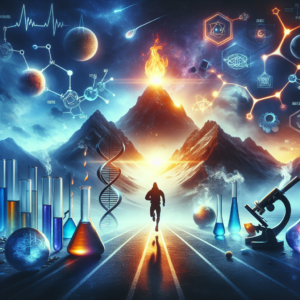In a world increasingly driven by scientific inquiry and technological advancement, the intersection of faith and science often raises profound questions. Among the most intriguing and contentious subjects within this intersection is the creation of the universe and the origins of life. Many find conflict between the narratives presented in sacred texts and the theories proposed by contemporary science. However, a closer examination reveals an inspiring and enriching dialogue that can, and should, exist between biblical accounts and scientific understanding.
The Biblical Narrative of Creation
The Bible opens with a powerful declaration: "In the beginning, God created the heavens and the earth" (Genesis 1:1). Over six days, the narrative unfolds, detailing the separation of light from darkness, the emergence of land and seas, the appearance of plants, animals, and finally humankind, crafted in the divine image. These accounts have inspired countless generations, offering not just an explanation of existence, but a profound articulation of purpose, morality, and the dignity inherent in human life.
This creation narrative establishes a framework emphasizing that the universe is not random but intentionally designed, sparking the imagination of theologians, artists, and thinkers throughout history. These stories remind us of our intrinsic connection to a creator, providing a sense of belonging and giving meaning to our existence.
The Scientific Perspective
On the other side of the spectrum, the scientific community has made remarkable strides in understanding the origin of the universe and life itself. The Big Bang Theory offers a compelling explanation for the universe’s beginnings, suggesting that it emerged approximately 13.8 billion years ago from an incredibly hot and dense state. Meanwhile, evolutionary biology provides insights into the mechanisms driving the diversity of life on Earth, such as natural selection and genetic mutation.
While some may see these scientific theories as contradicting the biblical account, they can also be interpreted through a lens that appreciates the complexity and magnificence of creation. Science, at its core, is a method of investigation that seeks to uncover the workings of the universe, often leading to awe-inspiring revelations about the nature of existence.
A Harmonious Dialogue
The challenge and beauty of bridging these two domains lie in recognizing their potential to coexist harmoniously. Many theologians and scientists see the potential for dialogue rather than discord. They advocate for an integrative approach in which biblical narratives and scientific theories illuminate one another, providing a more profound understanding of creation.
For instance, the concept of creation "ex nihilo" (creation out of nothing), as posited in many theological frameworks, can find common ground with the scientific notion that the universe began from a singularity. The timeline of creation presented in Genesis may not need to conflict with an understanding of the geological and astronomical timescales established by science. Instead, one can view the biblical days of creation as metaphorical periods, each representing epochs of profound transformation rather than strictly literal 24-hour days.
Furthermore, science often reveals the intricate systems and laws governing the universe—from the cellular structure of life to the cosmic forces that shape galaxies. These discoveries can inspire a deeper reverence for the divine craftsmanship attributed to God in biblical texts. Scientists like Albert Einstein and Francis Collins have expressed awe at the natural world, often interpreting their findings as reflections of a divine order.
Encouraging Coexistence
For many, exploring the harmony between biblical accounts and scientific understanding of creation is not just an intellectual exercise but a personal journey. It invites curiosity and fosters a spirit of inquiry. It encourages believers to seek knowledge through both spiritual and scientific means, enriching their faith while also embracing the wonders of the natural world.
The road forward doesn’t necessitate abandoning tradition or disregarding scientific findings; instead, it calls for an open heart and mind. Engaging with both perspectives can foster a culture of respect and collaboration, allowing individuals from both sides to learn from one another.
For those who grapple with apparent contradictions, it may be beneficial to remember that both science and religion aim to answer fundamental questions about our existence. Where science asks "how," religious narratives often address "why." Together, they can complement one another, fleshing out a fuller understanding of our world and our place within it.
Conclusion
Exploring the interplay between biblical creation accounts and scientific theories enriches our understanding and appreciation of life itself. In celebrating the combined wisdom of faith and science, we can cultivate a worldview that honors our spiritual heritage while embracing the wonders revealed by scientific inquiry. This journey offers an opportunity to promote dialogue, inspire curiosity, and build connections across diverse beliefs and perspectives.
In a world often characterized by division, let us embrace the harmony—a legacy of creation that unites rather than separates. Through this, we can move forward with hope and encouragement, eager to explore the mysteries and marvels of the universe together.
Explore and dig up answers yourself with our BGodInspired Bible Tools! Be careful – each interaction is like a new treasure hunt… you can get lost for hours 🙂


